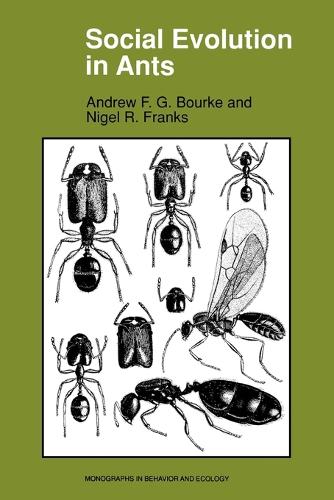
Social Evolution in Ants
(Paperback)
Publishing Details
Social Evolution in Ants
By (Author) Andrew F.G. Bourke
By (author) Nigel R. Franks
Princeton University Press
Princeton University Press
29th February 1996
United States
Classifications
Professional and Scholarly
Non Fiction
Ethology and animal behaviour
Zoology and animal sciences
595.7960451
Physical Properties
Paperback
550
Width 197mm, Height 254mm
482g
Description
Biologists have long been intrigued and confounded by the complex issues in the evolution and ecology of the social behaviour of insects. The self-sacrifice of sterile workers in ant colonies has been particularly difficult for evolutionary biologists to explain. This text presents an overview of the current state of scientific knowledge about social evolution in ants and shows how studies on ants have contributed to an understanding of many fundamental topics in behavioural ecology and evolutionary biology. The book explains kin selection theory and sex ratio theory and their applications to social evolution in insects. Aiming to dispel linering skepticism about the validity of kin selection and, more broadly, of "selfish gene" theory, the authors show how these ideas underpin the evolution of both co-operation and conflict within ant societies. In addition, using simple algebra, they provide detailed explanations of key mathematical models. Finally, they discuss two relatively little-known topics in ant social biology: life history strategy and mating systems.
Reviews
"I cannot praise their book too highly... [It] will surely become essential reading for any student interested in the evolution of insect sociality and will be a standard reference source for teachers and researchers alike."--The Times Higher Education Supplement "Social Evolution in Ants is recommended not only to people enthusiastic about social insects but also to those with a broad interest in evolution in general."--Nature
Author Bio
Andrew Bourke is a Research Fellow at the Institute of Zoology of the Zoological Society of London.Nigel Franks is a Senior Lecturer in the School of Biology and Biochemistry, University of Bath, England.
